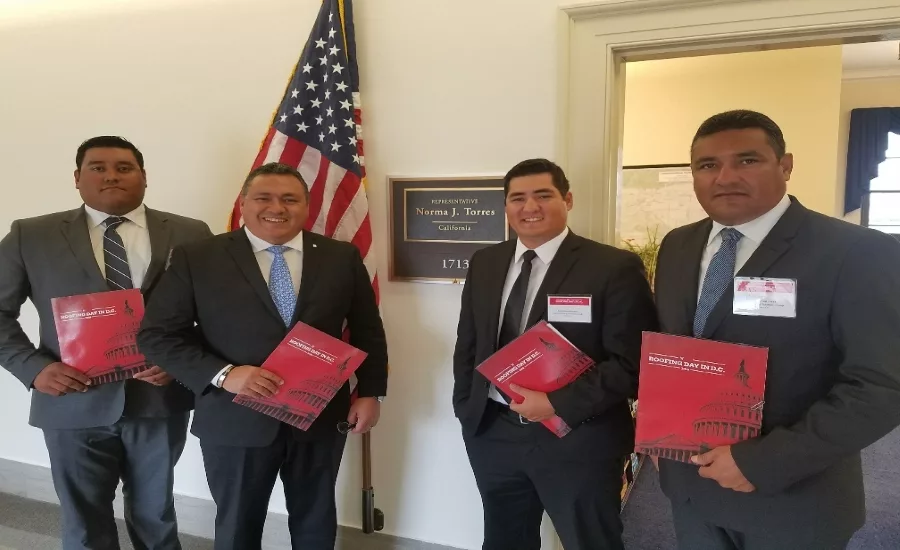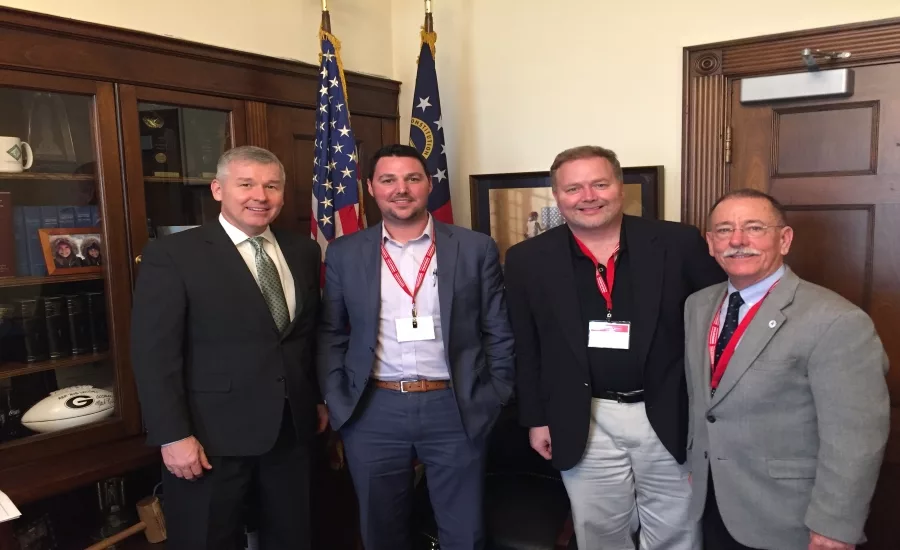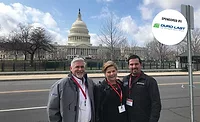Roofing Day 2018: A Roofing Industry First
Roofing contractors and industry professionals representing nearly all 50 states converged on Capitol Hill for first-ever lobbying event


WASHINGTON, D.C. — More than 400 roofing contractors and industry stakeholders from across the United States met with members of congress and legislative staff last week to relay their concerns as part of the first-ever Roofing Day.
Organized by the National Roofing Contractors Association (NRCA), the event drew contractors from 47 states in an unprecedented showing of political action for the industry. Attendees were separated into state delegations to effectively coordinate meetings with their elected officials in both the U.S. House of Representatives and the U.S. Senate. In all, delegates visited more than 350 individual House members and 94 Senate offices in what’s being called the largest advocacy event dedicated solely to the roofing industry.
“Today, we’ll put roofing professionals in 87 percent of all congressional offices,” said NRCA CEO Reid Ribble to a large round of applause at a breakfast meeting with all attendees. “It’s not bad for a first-time effort.”
Ribble began discussing the idea of a roofing industry ‘fly-in’ to lobby congress early last year, saying the stakeholders — roofing contractors, suppliers and manufacturers, needed to do a better job of speaking with a collective voice in Washington. He and the NRCA team — including its political action arm, ROOFPAC — orchestrated the event with political consultants from D.C.-based Prime Advocacy, and modeled it largely after what he saw watching other trade industries successfully do when lobbying congress as a three-term member of the House from Wisconsin.
He said it was good to be back in the nation’s capital, but was especially proud of the fact that so many industry stakeholders personally came to D.C. to begin the necessary conversations with congress about some of the changes the industry needs to see for future prosperity. The timing couldn’t be more crucial, he noted, as the entire body of the House, and nearly one-third of the current Senate faces re-election this November.
Craig Brightup, CEO of the Brightup Group, LLC and a long-time political consultant to the roofing industry, said the sitting party in the White House typically loses House seats in the mid-term election, and that Democrats are poised to gain the 25 seats needed to retake the majority there. However, he believes a booming economy strengthened by the recent federal tax cuts – particularly what they can do for roofing contractors — could help the GOP hold onto its control of the House and add to a slim majority in the Senate.
A Coordinated Cause
Given the uncertainty of the mid-term elections this fall, Ribble said it was critical that the industry’s message personally delivered on Capitol Hill remains consistent and strong enough to withstand any changes in political power or priorities.
Before loading eight busses to the congressional offices, attendees were briefed by Duane Musser, NRCA’s vice president of government relations, and given tips on how to maximize their meetings with sitting representatives and their staffers. Other highlights included speeches by Mick Mulvaney, Director of the U.S. Office of Management and Budget; and U.S. Sen. Ron Johnson, (R-Wisc.), who chairs the Committee on Homeland Security and Governmental Affairs.
Despite the diversity in roofing companies and roofing markets represented in the group, the critical issues facing the industry are universal. Each attendee received position papers drafted by the NRCA on key issues impacting roofing, such as immigration reform, regulatory reform and workforce development.
Whether greeted in the personal offices of their respective lawmaker, or in the crowded hallway between congressional offices, Roofing Day delegates stayed focused on their messages and delivered their talking points by becoming as close to true lobbyists as they could. Many met with members of congress that they voted for — and in some cases, against; and others met with legislative aides who treated the encounters and feedback as a vital component of their constituent services efforts.
The key was adopting the fast-paced, to-the-point style of legislative discussions and leaving behind resources for them to consider when the relevant issues come up in committee or caucus discussions.
Delegates shared a unified overall message that lack of workforce was the largest drain on the industry and that billions in economic activity could be developed if members of congress supported legal immigration efforts to meet the roofing contractor’s needs. That also meant frank discussions about opposing legislation that harmed legal immigration efforts.
On regulatory reform, industry stakeholders emphasized the impact of unforeseen costs stemming from burdensome government mandates. They also relayed their support for the Regulatory Accountability Act, which is designed to update the federal regulatory process in place for more than 70 years. Specifically, the bill will ensure improved cost-benefit analysis of any proposed regulation’s overall economic impact, and allow the industry to have input on that process.
Those that met with senators urged for a vote — and approval — of the Strengthening Career and Technical Education for the 21st Century Act, which already passed in the House. The bipartisan legislation expands educational opportunities with worked-based learning programs and strengthens incentives for the development of industry-wide credentials — another new NRCA priority under Ribble’s leadership.
Adding a Face
In addition to having a visible presence with lawmakers to discuss key policy issues, Roofing Day also represented an opportunity for the roofing industry to help change and improve the perception of roofing contractors on Capitol Hill. Rob Kornahrens, CEO of Advanced Roofing, of Ft. Lauderdale, Fla., made that his mission and brought along Djhym Joseph, a crew foreman, to Washington for the first time.
Kornahrens described Joseph as an exceptional veteran employee who continues to excel at his craft and leadership development on and off the roof. A Haitian refugee, the 35-year-old father of five was granted Temporary Protective Status (TPS) as being from a country that withstood a devastating earthquake in 2010. He legally worked as roofing contractor on renewable visas granted under the program, however, those renewals will cease in 2019, meaning he could face deportation.
“That’s why we’re here. I want to put a face to the issues,” Kornahrens said. “He’s paid his taxes, he’s trained to become a skilled tradesman, his kids are Americans who are not relying on the ‘system.’ If they send him back, that all changes.”
The Deichert family, third-generation commercial roofing contractors from Farmington Hills, Mich., also came to Washington to relay their personal message. The founders of ROOF Management Co., Inc., Thomas Deichert Sr. and wife, Terry, shared a strong belief that workforce training programs need to be enhanced and available to high school students to develop the next generation of skilled workers.
“We’ve been pushing kids toward four-year degrees and that’s really hurt our industry,” Thomas explained to legislative aide to one of Michigan’s Democratic senators. “They don’t even have a chance to know if they like working outdoors, with their hands and creating something. We’ve got to bring that back.”
The Deicherts were encouraged to learn that both senators they visited were supportive of enhancing career technical education programs and services provided by high school guidance counselors.
U.S. Sen. Debbie Stabenow, D-Mich, recently introduced the New Skills for New Jobs Act, which aims to close the skills gap in the U.S. by focusing on strengthening employer training partnerships, connecting students with career and job opportunities, and investing in job training opportunities for workers. Senators are also expected to decide on the renewal of the Perkins Act, which was initially established in the 1980s to increase the quality of technical education within the U.S. to help the economy grow. The House approved reauthorization last summer, but no action has occurred in the Senate. Officials on Capitol Hill said they’re optimistic that a vote could come before the end of the year.
Whether legislation moves forward as a result of those lobbying efforts is hard to determine, but the turnout of roofing contractors and entire delegations from as far away as Hawaii and Alaska impressed many in attendance. Given the current political climate in Washington and the often glacial pace of lawmaking, Brightup said the sheer visibility of a unified roofing industry shouldn’t be overlooked when evaluating Roofing Day’s success.
“The impact of the first Roofing Day in D.C. should be judged by its footprint on Capitol Hill and traction on workforce issues,” Brightup said. “The national certification program that’s being instituted by NRCA should help participants make the case for workforce development.”
Art Aisner is editor of Roofing Contractor. He can be reached at 248-244-6497 or aisnera@bnpmedia.com.
Looking for a reprint of this article?
From high-res PDFs to custom plaques, order your copy today!






